Deck 9: New Functions From Old
Question
Question
Question
Question
Question
Question
Question
Question
Question
Question
Question
Question
Question
Question
Question
Question
Question
Question
Question
Question
Question
Question
Question
Question
Question
Question
Question
Question
Question
Question
Question
Question
Question
Question
Question
Question
Question
Question
Question
Question
Question
Question
Question
Question
Question
Question
Question
Question
Question
Question
Question
Question
Question
Question
Question
Question
Question
Question
Question
Question
Question
Question
Question
Question
Question
Question
Question
Question
Question
Question
Question
Question
Question
Question
Question
Question
Question
Question
Question
Question

Unlock Deck
Sign up to unlock the cards in this deck!
Unlock Deck
Unlock Deck
1/137
Play
Full screen (f)
Deck 9: New Functions From Old
1
Select the equation whose graph is the graph of  vertically stretched by a factor of 8.
vertically stretched by a factor of 8.
A)
B)
C)
D)
 vertically stretched by a factor of 8.
vertically stretched by a factor of 8.A)

B)

C)

D)


2
Select the choice which best describes the graph of . 
A) It is the graph of shifted 8 units to the left.
shifted 8 units to the left.
B) It is the graph of vertically stretched by a factor of 8.
vertically stretched by a factor of 8.
C) It is the graph of shifted 8 units down.
shifted 8 units down.
D) It is the graph of vertically stretched by a factor of 8 and reflected across the x-axis.
vertically stretched by a factor of 8 and reflected across the x-axis.

A) It is the graph of
 shifted 8 units to the left.
shifted 8 units to the left.B) It is the graph of
 vertically stretched by a factor of 8.
vertically stretched by a factor of 8.C) It is the graph of
 shifted 8 units down.
shifted 8 units down.D) It is the graph of
 vertically stretched by a factor of 8 and reflected across the x-axis.
vertically stretched by a factor of 8 and reflected across the x-axis.It is the graph of  vertically stretched by a factor of 8.
vertically stretched by a factor of 8.
 vertically stretched by a factor of 8.
vertically stretched by a factor of 8. 3
Select the equation whose graph is the graph of  vertically stretched by a factor of
vertically stretched by a factor of  and reflected across the x-axis.
and reflected across the x-axis.
A)
B)
C)
D)
 vertically stretched by a factor of
vertically stretched by a factor of  and reflected across the x-axis.
and reflected across the x-axis.A)

B)

C)

D)


4
Select the choice which best describes the graph of  .
.
A) It is the graph of shifted 2 units to the right.
shifted 2 units to the right.
B) It is the graph of vertically stretched by a factor of 2.
vertically stretched by a factor of 2.
C) It is the graph of shifted 2 units up.
shifted 2 units up.
D) It is the graph of vertically stretched by a factor of 2 and reflected across the x-axis.
vertically stretched by a factor of 2 and reflected across the x-axis.
 .
.A) It is the graph of
 shifted 2 units to the right.
shifted 2 units to the right.B) It is the graph of
 vertically stretched by a factor of 2.
vertically stretched by a factor of 2.C) It is the graph of
 shifted 2 units up.
shifted 2 units up.D) It is the graph of
 vertically stretched by a factor of 2 and reflected across the x-axis.
vertically stretched by a factor of 2 and reflected across the x-axis.
Unlock Deck
Unlock for access to all 137 flashcards in this deck.
Unlock Deck
k this deck
5
Select the equation whose graph is the graph of  shifted 6 units up.
shifted 6 units up.
A)
B)
C)
D)
 shifted 6 units up.
shifted 6 units up.A)

B)

C)

D)


Unlock Deck
Unlock for access to all 137 flashcards in this deck.
Unlock Deck
k this deck
6
Select the choice which best describes the graph of . 
A) It is the graph of shifted 6 units up.
shifted 6 units up.
B) It is the graph of vertically stretched by a factor of 6.
vertically stretched by a factor of 6.
C) It is the graph of shifted 6 units to the right.
shifted 6 units to the right.
D) It is the graph of shifted 6 units down.
shifted 6 units down.

A) It is the graph of
 shifted 6 units up.
shifted 6 units up.B) It is the graph of
 vertically stretched by a factor of 6.
vertically stretched by a factor of 6.C) It is the graph of
 shifted 6 units to the right.
shifted 6 units to the right.D) It is the graph of
 shifted 6 units down.
shifted 6 units down.
Unlock Deck
Unlock for access to all 137 flashcards in this deck.
Unlock Deck
k this deck
7
Select the equation whose graph is the graph of  shifted 10 units to the right.
shifted 10 units to the right.
A)
B)
C)
D)
 shifted 10 units to the right.
shifted 10 units to the right.A)

B)

C)

D)


Unlock Deck
Unlock for access to all 137 flashcards in this deck.
Unlock Deck
k this deck
8
Select the choice which best describes the graph of . 
A) It is the graph of shifted 9 units to the right.
shifted 9 units to the right.
B) It is the graph of vertically stretched by a factor of 9.
vertically stretched by a factor of 9.
C) It is the graph of shifted 9 units down.
shifted 9 units down.
D) It is the graph of shifted 9 units to the left.
shifted 9 units to the left.

A) It is the graph of
 shifted 9 units to the right.
shifted 9 units to the right.B) It is the graph of
 vertically stretched by a factor of 9.
vertically stretched by a factor of 9.C) It is the graph of
 shifted 9 units down.
shifted 9 units down.D) It is the graph of
 shifted 9 units to the left.
shifted 9 units to the left.
Unlock Deck
Unlock for access to all 137 flashcards in this deck.
Unlock Deck
k this deck
9
Select the equation whose graph is the graph of  reflected horizontally (across the y-axis).
reflected horizontally (across the y-axis).
A)
B)
C)
D)
 reflected horizontally (across the y-axis).
reflected horizontally (across the y-axis).A)

B)

C)

D)


Unlock Deck
Unlock for access to all 137 flashcards in this deck.
Unlock Deck
k this deck
10
Select the choice which best describes the graph of . 
A) It is the graph of reflected vertically (across the x-axis).
reflected vertically (across the x-axis).
B) It is the graph of shifted 1 unit to the right.
shifted 1 unit to the right.
C) It is the graph of shifted 1 unit down.
shifted 1 unit down.
D) It is the graph of reflected horizontally (across the y-axis).
reflected horizontally (across the y-axis).

A) It is the graph of
 reflected vertically (across the x-axis).
reflected vertically (across the x-axis).B) It is the graph of
 shifted 1 unit to the right.
shifted 1 unit to the right.C) It is the graph of
 shifted 1 unit down.
shifted 1 unit down.D) It is the graph of
 reflected horizontally (across the y-axis).
reflected horizontally (across the y-axis).
Unlock Deck
Unlock for access to all 137 flashcards in this deck.
Unlock Deck
k this deck
11
Transform the function  into a new function
into a new function  by compressing
by compressing  by a factor of 0.3, reflecting across the x-axis, and then shifting the result down 8 units. Find the equation of
by a factor of 0.3, reflecting across the x-axis, and then shifting the result down 8 units. Find the equation of  .
.
 into a new function
into a new function  by compressing
by compressing  by a factor of 0.3, reflecting across the x-axis, and then shifting the result down 8 units. Find the equation of
by a factor of 0.3, reflecting across the x-axis, and then shifting the result down 8 units. Find the equation of  .
.
Unlock Deck
Unlock for access to all 137 flashcards in this deck.
Unlock Deck
k this deck
12
Transform the function  into a new function
into a new function  by compressing
by compressing  by a factor of 0.9 and reflecting across the x-axis, and then shifting the result up 4 units. Find the equation of
by a factor of 0.9 and reflecting across the x-axis, and then shifting the result up 4 units. Find the equation of  .
.
 into a new function
into a new function  by compressing
by compressing  by a factor of 0.9 and reflecting across the x-axis, and then shifting the result up 4 units. Find the equation of
by a factor of 0.9 and reflecting across the x-axis, and then shifting the result up 4 units. Find the equation of  .
.
Unlock Deck
Unlock for access to all 137 flashcards in this deck.
Unlock Deck
k this deck
13
Transform the function  into a new function
into a new function  by shifting
by shifting  horizontally 3 units to the left and then shifting the result down 6 units.Find the equation of
horizontally 3 units to the left and then shifting the result down 6 units.Find the equation of  .
.
 into a new function
into a new function  by shifting
by shifting  horizontally 3 units to the left and then shifting the result down 6 units.Find the equation of
horizontally 3 units to the left and then shifting the result down 6 units.Find the equation of  .
.
Unlock Deck
Unlock for access to all 137 flashcards in this deck.
Unlock Deck
k this deck
14
Transform the function  into a new function
into a new function  by reflecting
by reflecting  horizontally (across the y-axis) and then shifting the result up 3 units.
horizontally (across the y-axis) and then shifting the result up 3 units.
Find the equation of .
.
 into a new function
into a new function  by reflecting
by reflecting  horizontally (across the y-axis) and then shifting the result up 3 units.
horizontally (across the y-axis) and then shifting the result up 3 units.Find the equation of
 .
.
Unlock Deck
Unlock for access to all 137 flashcards in this deck.
Unlock Deck
k this deck
15
Transform the function  into a new function
into a new function  by shifting
by shifting  horizontally 10 units to the right, reflecting the result across the x-axis, and then shifting the result down 6 units.
horizontally 10 units to the right, reflecting the result across the x-axis, and then shifting the result down 6 units.
Find the equation of .
.
 into a new function
into a new function  by shifting
by shifting  horizontally 10 units to the right, reflecting the result across the x-axis, and then shifting the result down 6 units.
horizontally 10 units to the right, reflecting the result across the x-axis, and then shifting the result down 6 units.Find the equation of
 .
.
Unlock Deck
Unlock for access to all 137 flashcards in this deck.
Unlock Deck
k this deck
16
Find the formula for  where
where 
 where
where 

Unlock Deck
Unlock for access to all 137 flashcards in this deck.
Unlock Deck
k this deck
17
Find a formula for  where
where 
 where
where 

Unlock Deck
Unlock for access to all 137 flashcards in this deck.
Unlock Deck
k this deck
18
Find a formula for  where
where 
 where
where 

Unlock Deck
Unlock for access to all 137 flashcards in this deck.
Unlock Deck
k this deck
19
Find a formula for  where
where 
 where
where 

Unlock Deck
Unlock for access to all 137 flashcards in this deck.
Unlock Deck
k this deck
20
Transform the function  into a new function
into a new function  by reflecting horizontally (across the y-axis), stretching
by reflecting horizontally (across the y-axis), stretching  by a factor of 7 , and then shifting the result up 9 units.
by a factor of 7 , and then shifting the result up 9 units.
Find the equation of .
.
 into a new function
into a new function  by reflecting horizontally (across the y-axis), stretching
by reflecting horizontally (across the y-axis), stretching  by a factor of 7 , and then shifting the result up 9 units.
by a factor of 7 , and then shifting the result up 9 units.Find the equation of
 .
.
Unlock Deck
Unlock for access to all 137 flashcards in this deck.
Unlock Deck
k this deck
21
Find a formula for  where
where 
 where
where 

Unlock Deck
Unlock for access to all 137 flashcards in this deck.
Unlock Deck
k this deck
22
If graph A is the graph of  , which of the following will yield graph B?
, which of the following will yield graph B?
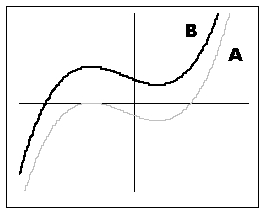
A)
B)
C)
D)
 , which of the following will yield graph B?
, which of the following will yield graph B?
A)

B)

C)

D)


Unlock Deck
Unlock for access to all 137 flashcards in this deck.
Unlock Deck
k this deck
23
If graph A is the graph of  , which of the following will yield graph B?
, which of the following will yield graph B?
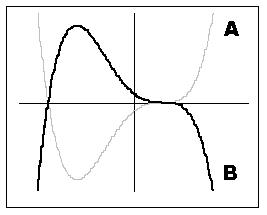
A)
B)
C)
D)
 , which of the following will yield graph B?
, which of the following will yield graph B?
A)

B)

C)

D)


Unlock Deck
Unlock for access to all 137 flashcards in this deck.
Unlock Deck
k this deck
24
If graph A is the graph of  , which of the following will yield graph B?
, which of the following will yield graph B?
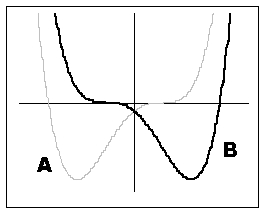
A)
B)
C)
D)
 , which of the following will yield graph B?
, which of the following will yield graph B?
A)

B)

C)

D)


Unlock Deck
Unlock for access to all 137 flashcards in this deck.
Unlock Deck
k this deck
25
If graph A is the graph of  , which of the following will yield graph B?
, which of the following will yield graph B?
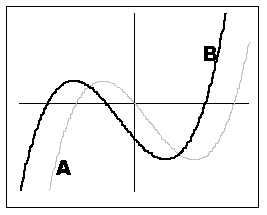
A)
B)
C)
D)
 , which of the following will yield graph B?
, which of the following will yield graph B?
A)

B)

C)

D)


Unlock Deck
Unlock for access to all 137 flashcards in this deck.
Unlock Deck
k this deck
26
If graph A is the graph of  , which of the following will yield graph B?
, which of the following will yield graph B?
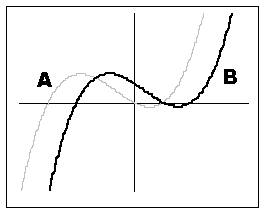
A)
B)
C)
D)
 , which of the following will yield graph B?
, which of the following will yield graph B?
A)

B)

C)

D)


Unlock Deck
Unlock for access to all 137 flashcards in this deck.
Unlock Deck
k this deck
27
If graph A is the graph of  , which of the following will yield graph B?
, which of the following will yield graph B?
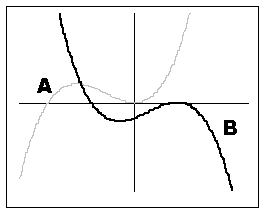
A)
B)
C)
D)
 , which of the following will yield graph B?
, which of the following will yield graph B?
A)

B)

C)

D)


Unlock Deck
Unlock for access to all 137 flashcards in this deck.
Unlock Deck
k this deck
28
If graph A is the graph of  , which of the following will yield graph B?
, which of the following will yield graph B?
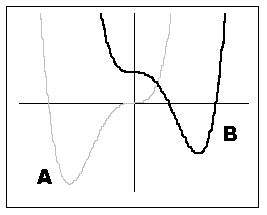
A)
B)
C)
D)
 , which of the following will yield graph B?
, which of the following will yield graph B?
A)

B)

C)

D)


Unlock Deck
Unlock for access to all 137 flashcards in this deck.
Unlock Deck
k this deck
29
If graph A is the graph of  , which of the following will yield graph B?
, which of the following will yield graph B?
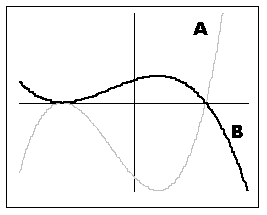
A)
B)
C)
D)
 , which of the following will yield graph B?
, which of the following will yield graph B?
A)

B)

C)

D)


Unlock Deck
Unlock for access to all 137 flashcards in this deck.
Unlock Deck
k this deck
30
Use the graph of  below to determine which statement is true.
below to determine which statement is true.
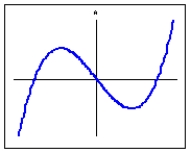
A) is not symmetric
is not symmetric
B) is symmetric about the origin
is symmetric about the origin
C) is symmetric across the y-axis
is symmetric across the y-axis
D) is symmetric across the x-axis
is symmetric across the x-axis
 below to determine which statement is true.
below to determine which statement is true.
A)
 is not symmetric
is not symmetricB)
 is symmetric about the origin
is symmetric about the originC)
 is symmetric across the y-axis
is symmetric across the y-axisD)
 is symmetric across the x-axis
is symmetric across the x-axis
Unlock Deck
Unlock for access to all 137 flashcards in this deck.
Unlock Deck
k this deck
31
Determine which statement is true for . 
A) is symmetric across the x-axis.
is symmetric across the x-axis.
B) is symmetric across the y-axis.
is symmetric across the y-axis.
C) is symmetric about the origin.
is symmetric about the origin.
D) is not symmetric.
is not symmetric.

A)
 is symmetric across the x-axis.
is symmetric across the x-axis.B)
 is symmetric across the y-axis.
is symmetric across the y-axis.C)
 is symmetric about the origin.
is symmetric about the origin.D)
 is not symmetric.
is not symmetric.
Unlock Deck
Unlock for access to all 137 flashcards in this deck.
Unlock Deck
k this deck
32
Determine which statement is true for . 
A) is symmetric across the x-axis.
is symmetric across the x-axis.
B) is symmetric across the y-axis.
is symmetric across the y-axis.
C) is symmetric about the origin.
is symmetric about the origin.
D) is not symmetric.
is not symmetric.

A)
 is symmetric across the x-axis.
is symmetric across the x-axis.B)
 is symmetric across the y-axis.
is symmetric across the y-axis.C)
 is symmetric about the origin.
is symmetric about the origin.D)
 is not symmetric.
is not symmetric.
Unlock Deck
Unlock for access to all 137 flashcards in this deck.
Unlock Deck
k this deck
33
Determine which statement is true for . 
A) is symmetric across the x-axis.
is symmetric across the x-axis.
B) is symmetric across the y-axis.
is symmetric across the y-axis.
C) is symmetric about the origin.
is symmetric about the origin.
D) is not symmetric.
is not symmetric.

A)
 is symmetric across the x-axis.
is symmetric across the x-axis.B)
 is symmetric across the y-axis.
is symmetric across the y-axis.C)
 is symmetric about the origin.
is symmetric about the origin.D)
 is not symmetric.
is not symmetric.
Unlock Deck
Unlock for access to all 137 flashcards in this deck.
Unlock Deck
k this deck
34
Determine which statement is true for 
A) is symmetric across the x-axis.
is symmetric across the x-axis.
B) is symmetric across the y-axis.
is symmetric across the y-axis.
C) is symmetric about the origin.
is symmetric about the origin.
D) is not symmetric.
is not symmetric.

A)
 is symmetric across the x-axis.
is symmetric across the x-axis.B)
 is symmetric across the y-axis.
is symmetric across the y-axis.C)
 is symmetric about the origin.
is symmetric about the origin.D)
 is not symmetric.
is not symmetric.
Unlock Deck
Unlock for access to all 137 flashcards in this deck.
Unlock Deck
k this deck
35
Determine which statement is true for 
A) is symmetric across the x-axis.
is symmetric across the x-axis.
B) is symmetric across the y-axis.
is symmetric across the y-axis.
C) is symmetric about the origin.
is symmetric about the origin.
D) is not symmetric.
is not symmetric.

A)
 is symmetric across the x-axis.
is symmetric across the x-axis.B)
 is symmetric across the y-axis.
is symmetric across the y-axis.C)
 is symmetric about the origin.
is symmetric about the origin.D)
 is not symmetric.
is not symmetric.
Unlock Deck
Unlock for access to all 137 flashcards in this deck.
Unlock Deck
k this deck
36
Determine which statement is true for 
A) is symmetric across the x-axis.
is symmetric across the x-axis.
B) is symmetric across the y-axis.
is symmetric across the y-axis.
C) is symmetric about the origin.
is symmetric about the origin.
D) is not symmetric.
is not symmetric.

A)
 is symmetric across the x-axis.
is symmetric across the x-axis.B)
 is symmetric across the y-axis.
is symmetric across the y-axis.C)
 is symmetric about the origin.
is symmetric about the origin.D)
 is not symmetric.
is not symmetric.
Unlock Deck
Unlock for access to all 137 flashcards in this deck.
Unlock Deck
k this deck
37
Identify the function 
A) Even
B) Odd
C) Neither

A) Even
B) Odd
C) Neither

Unlock Deck
Unlock for access to all 137 flashcards in this deck.
Unlock Deck
k this deck
38
Identify this graph as symmetrical about the x-axis, y-axis, or the origin.
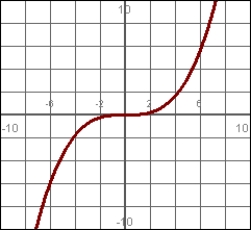
A) X-axis
B) Origin
C) Y-axis
D) Neither

A) X-axis
B) Origin
C) Y-axis
D) Neither

Unlock Deck
Unlock for access to all 137 flashcards in this deck.
Unlock Deck
k this deck
39
Given the function  , the function
, the function  is created by reflecting f(x) around the
is created by reflecting f(x) around the
A) origin.
B) Not a reflection
C) y-axis.
D) x-axis.
 , the function
, the function  is created by reflecting f(x) around the
is created by reflecting f(x) around theA) origin.
B) Not a reflection
C) y-axis.
D) x-axis.

Unlock Deck
Unlock for access to all 137 flashcards in this deck.
Unlock Deck
k this deck
40
Evaluate  where
where  and
and 
 where
where  and
and 

Unlock Deck
Unlock for access to all 137 flashcards in this deck.
Unlock Deck
k this deck
41
Evaluate  where
where  and
and 
 where
where  and
and 

Unlock Deck
Unlock for access to all 137 flashcards in this deck.
Unlock Deck
k this deck
42
Evaluate  where
where  and
and 
 where
where  and
and 

Unlock Deck
Unlock for access to all 137 flashcards in this deck.
Unlock Deck
k this deck
43
Evaluate  where
where  and
and  Write your answer as a reduced fraction.
Write your answer as a reduced fraction.
 where
where  and
and  Write your answer as a reduced fraction.
Write your answer as a reduced fraction.
Unlock Deck
Unlock for access to all 137 flashcards in this deck.
Unlock Deck
k this deck
44
Find  where
where  and
and 
 where
where  and
and 

Unlock Deck
Unlock for access to all 137 flashcards in this deck.
Unlock Deck
k this deck
45
Find  where
where  and
and 
 where
where  and
and 

Unlock Deck
Unlock for access to all 137 flashcards in this deck.
Unlock Deck
k this deck
46
Find  where
where  and
and 
 where
where  and
and 

Unlock Deck
Unlock for access to all 137 flashcards in this deck.
Unlock Deck
k this deck
47
Find  where
where  and
and 
 where
where  and
and 

Unlock Deck
Unlock for access to all 137 flashcards in this deck.
Unlock Deck
k this deck
48
Evaluate  where
where  and
and  Give an exact answer in the form of a reduced fraction.
Give an exact answer in the form of a reduced fraction.
 where
where  and
and  Give an exact answer in the form of a reduced fraction.
Give an exact answer in the form of a reduced fraction.
Unlock Deck
Unlock for access to all 137 flashcards in this deck.
Unlock Deck
k this deck
49
Evaluate  where
where  and
and  Give a decimal answer. Round your answer to 2 decimal places, if necessary.
Give a decimal answer. Round your answer to 2 decimal places, if necessary.
 where
where  and
and  Give a decimal answer. Round your answer to 2 decimal places, if necessary.
Give a decimal answer. Round your answer to 2 decimal places, if necessary.
Unlock Deck
Unlock for access to all 137 flashcards in this deck.
Unlock Deck
k this deck
50
Evaluate  where
where  and
and  Give an exact answer in the form of a reduced fraction.
Give an exact answer in the form of a reduced fraction.
 where
where  and
and  Give an exact answer in the form of a reduced fraction.
Give an exact answer in the form of a reduced fraction.
Unlock Deck
Unlock for access to all 137 flashcards in this deck.
Unlock Deck
k this deck
51
Evaluate  where
where  and
and  Give a decimal answer. Round your answer to 2 decimal places, if necessary.
Give a decimal answer. Round your answer to 2 decimal places, if necessary.
 where
where  and
and  Give a decimal answer. Round your answer to 2 decimal places, if necessary.
Give a decimal answer. Round your answer to 2 decimal places, if necessary.
Unlock Deck
Unlock for access to all 137 flashcards in this deck.
Unlock Deck
k this deck
52
Evaluate  where
where  and
and  Give an exact answer in the form of a reduced fraction.
Give an exact answer in the form of a reduced fraction.
 where
where  and
and  Give an exact answer in the form of a reduced fraction.
Give an exact answer in the form of a reduced fraction.
Unlock Deck
Unlock for access to all 137 flashcards in this deck.
Unlock Deck
k this deck
53
Evaluate  where
where  and
and  Give a decimal answer. Round your answer to 2 decimal places, if necessary.
Give a decimal answer. Round your answer to 2 decimal places, if necessary.
 where
where  and
and  Give a decimal answer. Round your answer to 2 decimal places, if necessary.
Give a decimal answer. Round your answer to 2 decimal places, if necessary.
Unlock Deck
Unlock for access to all 137 flashcards in this deck.
Unlock Deck
k this deck
54
Evaluate  where
where  and
and  Give an exact answer in the form of a reduced fraction.
Give an exact answer in the form of a reduced fraction.
 where
where  and
and  Give an exact answer in the form of a reduced fraction.
Give an exact answer in the form of a reduced fraction.
Unlock Deck
Unlock for access to all 137 flashcards in this deck.
Unlock Deck
k this deck
55
Evaluate  where
where  and
and  Give a decimal answer. Round your answer to 2 decimal places, if necessary.
Give a decimal answer. Round your answer to 2 decimal places, if necessary.
 where
where  and
and  Give a decimal answer. Round your answer to 2 decimal places, if necessary.
Give a decimal answer. Round your answer to 2 decimal places, if necessary.
Unlock Deck
Unlock for access to all 137 flashcards in this deck.
Unlock Deck
k this deck
56
Use the table to evaluate the function : 




Unlock Deck
Unlock for access to all 137 flashcards in this deck.
Unlock Deck
k this deck
57
Use the table to evaluate the function : 




Unlock Deck
Unlock for access to all 137 flashcards in this deck.
Unlock Deck
k this deck
58
Use the table to evaluate the function  : (Round the answer to 2 decimal places if necessary.)
: (Round the answer to 2 decimal places if necessary.)

 : (Round the answer to 2 decimal places if necessary.)
: (Round the answer to 2 decimal places if necessary.)

Unlock Deck
Unlock for access to all 137 flashcards in this deck.
Unlock Deck
k this deck
59
If f(x) = 4x and g(x) = 2x, evaluate . 


Unlock Deck
Unlock for access to all 137 flashcards in this deck.
Unlock Deck
k this deck
60
Use the table to create a table for the function  : (Round the answer to 2 decimal places if necessary.)
: (Round the answer to 2 decimal places if necessary.) 
 : (Round the answer to 2 decimal places if necessary.)
: (Round the answer to 2 decimal places if necessary.) 

Unlock Deck
Unlock for access to all 137 flashcards in this deck.
Unlock Deck
k this deck
61
Use the table to create the table for the function : 




Unlock Deck
Unlock for access to all 137 flashcards in this deck.
Unlock Deck
k this deck
62
Given the functions shown in this graph, select the graph that shows . 
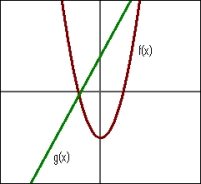
A)
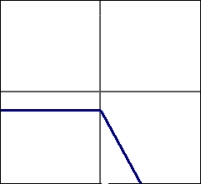
B)
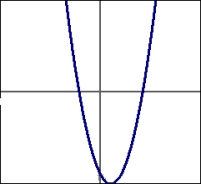
C)
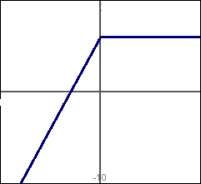
D)
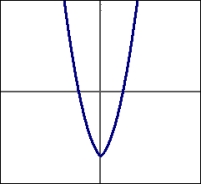


A)

B)

C)

D)


Unlock Deck
Unlock for access to all 137 flashcards in this deck.
Unlock Deck
k this deck
63
At most how many turning points does the graph of  have?
have?
 have?
have?
Unlock Deck
Unlock for access to all 137 flashcards in this deck.
Unlock Deck
k this deck
64
At most how many horizontal intercepts does the graph of  have?
have?
 have?
have?
Unlock Deck
Unlock for access to all 137 flashcards in this deck.
Unlock Deck
k this deck
65
Choose the description that describes the end behavior of the graph of . 
A) and
and 
B) and
and 
C) and
and 
D) and
and 

A)
 and
and 
B)
 and
and 
C)
 and
and 
D)
 and
and 

Unlock Deck
Unlock for access to all 137 flashcards in this deck.
Unlock Deck
k this deck
66
Choose the function below whose end behavior matches the description.
 and
and 
A)
B)
C)
D)
 and
and 
A)

B)

C)

D)


Unlock Deck
Unlock for access to all 137 flashcards in this deck.
Unlock Deck
k this deck
67
Which of the following describes the polynomial pictured?
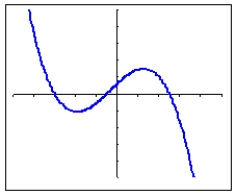
A) It is a degree 4 polynomial with a negative leading term.
B) It is a degree 4 polynomial with a positive leading term.
C) It is a degree 3 polynomial with a negative leading term.
D) It is a degree 3 polynomial with a positive leading term.

A) It is a degree 4 polynomial with a negative leading term.
B) It is a degree 4 polynomial with a positive leading term.
C) It is a degree 3 polynomial with a negative leading term.
D) It is a degree 3 polynomial with a positive leading term.

Unlock Deck
Unlock for access to all 137 flashcards in this deck.
Unlock Deck
k this deck
68
What is the minimum degree of the polynomial pictured?
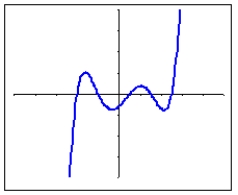


Unlock Deck
Unlock for access to all 137 flashcards in this deck.
Unlock Deck
k this deck
69
What is the minimum degree of the polynomial pictured?
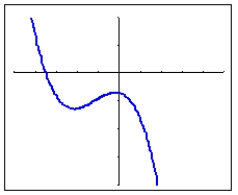


Unlock Deck
Unlock for access to all 137 flashcards in this deck.
Unlock Deck
k this deck
70
Find the horizontal intercepts of the function .  Write your answers
Write your answers  in ascending order .
in ascending order . 
 Write your answers
Write your answers  in ascending order .
in ascending order . 

Unlock Deck
Unlock for access to all 137 flashcards in this deck.
Unlock Deck
k this deck
71
Find the horizontal intercepts of the function .  Write your answers
Write your answers  in ascending order .
in ascending order . 
 Write your answers
Write your answers  in ascending order .
in ascending order . 

Unlock Deck
Unlock for access to all 137 flashcards in this deck.
Unlock Deck
k this deck
72
Find the horizontal intercepts of the function .  Write your answers
Write your answers  in ascending order .
in ascending order . 
 Write your answers
Write your answers  in ascending order .
in ascending order . 

Unlock Deck
Unlock for access to all 137 flashcards in this deck.
Unlock Deck
k this deck
73
Find a polynomial function with horizontal intercepts -6, 2, and 6 and vertical intercept -72.
Write your answer in standard form, .
Write your answer in standard form, .


Unlock Deck
Unlock for access to all 137 flashcards in this deck.
Unlock Deck
k this deck
74
Find a polynomial function with horizontal intercepts -6, -5, -1, and 1 and vertical intercept 30.
Write your answer in standard form, .
Write your answer in standard form, .


Unlock Deck
Unlock for access to all 137 flashcards in this deck.
Unlock Deck
k this deck
75
Find a polynomial function with horizontal intercepts 1, 2, 3, 4, and 7 and vertical intercept -168.
Write your answer in standard form, .
Write your answer in standard form, .


Unlock Deck
Unlock for access to all 137 flashcards in this deck.
Unlock Deck
k this deck
76
Find a polynomial function with horizontal intercepts 2, 4, and 5 and vertical intercept 120.
Write your answer in factored form, with .
with . 
Write your answer in factored form,
 with .
with . 

Unlock Deck
Unlock for access to all 137 flashcards in this deck.
Unlock Deck
k this deck
77
Find a polynomial function with horizontal intercepts -9, -8, 1, and 6 and vertical intercept -864.
Write your answer in factored form, with .
with . 
Write your answer in factored form,
 with .
with . 

Unlock Deck
Unlock for access to all 137 flashcards in this deck.
Unlock Deck
k this deck
78
Find a polynomial function with horizontal intercepts 2, 4, 5, 6, and 9 and vertical intercept 6480.
Write your answer in factored form, with .
with . 
Write your answer in factored form,
 with .
with . 

Unlock Deck
Unlock for access to all 137 flashcards in this deck.
Unlock Deck
k this deck
79
State the degree of the function:



Unlock Deck
Unlock for access to all 137 flashcards in this deck.
Unlock Deck
k this deck
80
Evaluate the following expression for x = -3.



Unlock Deck
Unlock for access to all 137 flashcards in this deck.
Unlock Deck
k this deck


